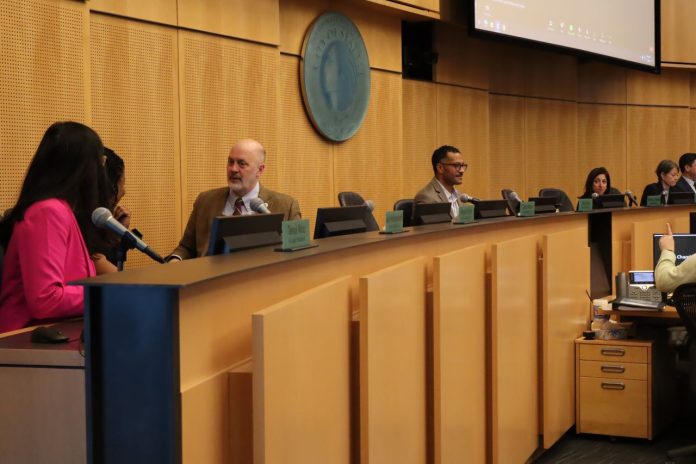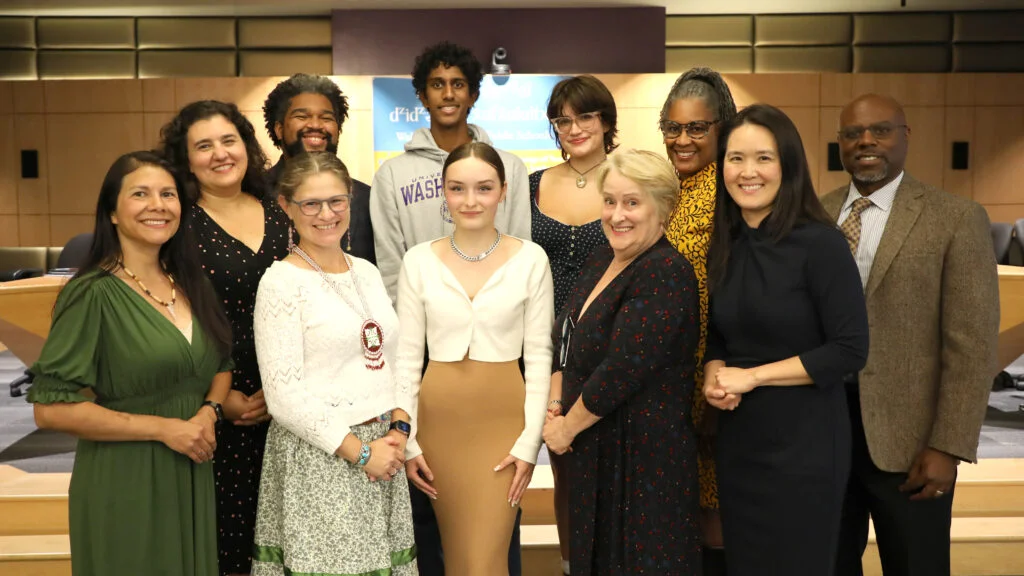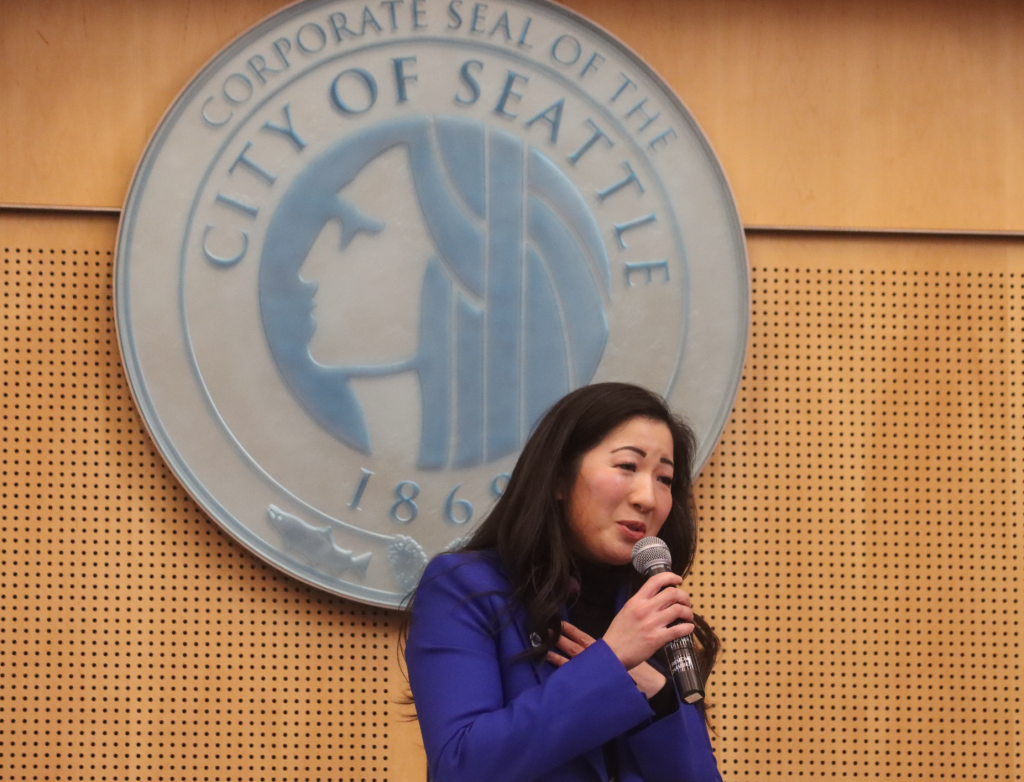
For the second time this year, Seattle City Council President Sara Nelson recently ordered the Council chambers cleared during public comment. It was just the latest and most jarring example of how the new city council under Nelson’s leadership is moving away from basic democratic principles and practices.
But City Hall isn’t the only place in Seattle where local government is busily eroding democracy. The Seattle Public Schools are further along the same path, having already adopted many of the same undemocratic practices now seen at City Hall. Whether a mere coincidence or not, the result is that we the people have less oversight and less control over what our local governments are doing – while monied interests like the Seattle Metropolitan Chamber of Commerce are gaining more power and more influence.
Limits on public comment
At the Council’s tumultuous August 6 meeting, Nelson shortened the public comment period, then cleared the chambers and reconvened remotely to approve a contract with a private jail in south King County and delay a vote on a ballot measure taxing high earners to fund social housing, despite popular support. It was the second time Nelson had conducted important council business remotely in order to limit public dissent. In February, Nelson cleared the chambers and had six members of the public arrested after refusing to hear concerns from refugee asylum seekers.
Nelson could easily take notes from the school board about how to limit public comment. Seattle Public Schools (SPS) already routinely limits public comment to just 20 speakers who must sign up in advance of the meeting. There is a waitlist, but the board president (who runs the meeting) often refuses to take any speakers from the waitlist.
Under Liza Rankin, who took over as board president last December, the already limited public comment is being scaled back even further. The school board recently voted to reduce its meeting schedule to only one per month, eliciting strong pushback from the Seattle Times editorial board and from community members. The school board said it intended to add a second monthly meeting for community engagement but so far this has not happened.

The reduction in regular board meetings comes on top of the school board eliminating nearly all of its standing committees, which as public meetings had also offered legally required public comment opportunities.
By eliminating most of its standing committees and one of the two monthly board meetings, the school board also significantly reduces the oversight they conduct regarding district operations, and reduces the public’s ability to view the details of those operations. The school board’s finance committee, for example, used to regularly air detailed reports about the district’s fiscal health. That committee no longer meets, and those details are no longer shared at regular board meetings, leaving the public with much less knowledge about district spending and district fiscal health.
The timing could not be worse as SPS gears up to potentially close 20 or more elementary schools in a blunt cost-cutting measure that has already inflamed the public, but hasn’t been shown to actually solve the district’s financial woes.
Withholding information from the public
Earlier this month Councilmember Cathy Moore stunned the public by insisting Council Central Staff redact multiple sections from a memo that raised concerns about Moore’s prostitution loitering bill. The Stranger’s Ashley Nerbovig obtained both versions of the memo and quoted former Council President Lorena González as saying this kind of revision was “not typical.”
Seattle Public Schools is unfortunately much further along in systematically withholding information from the public. The superintendent used to regularly publish a Friday memo that covered important topics, but this was discontinued since Brent Jones became superintendent in 2021. Minutes no longer contain summaries of director or public comments. Board action reports no longer contain detailed supporting documentation.
Most board materials, including agenda details and presentations, have been moved behind a registration wall. For example, to view the minutes of the June 26, 2024 school board meeting, one must have a registered account with Seattle Public Schools. If a member of the general public tries to view those materials, they receive a sign-in message that reads “This service is intended for authorized staff and students of Seattle Public Schools. Unauthorized access is audited and prohibited.”
District administrators are even reluctant to share important details with school board members, despite their oversight function and mandate from voters. Board members in recent years have been asked to submit questions in writing to administrators, who respond in writing. But since board directors Vivian Song and Lisa Rivera resigned from the board in February, no other board members have submitted such questions.
Rushed votes
The city council’s recent vote to contract with the notorious South Correctional Entity (SCORE jail) in Des Moines was described by many observers as “rushed,” including by The Urbanist’s own Amy Sundberg. Critics raised concerns about the well-being of inmates, considering the jail has seen a string of recent deaths in custody, and the logistics of longer commutes between downtown courthouse proceedings and a jail 15 miles south. Those concerns were shrugged off, rather than addressed. A council committee approved the jail contract in committee on July 31 and full Council greenlit the plan at the chaotic meeting on August 6.
Here again, the school board has already blazed the trail. Beginning in 2021 the school board attempted to approve its annual budgets as part of the consent agenda – a group of typically routine items that a legislative body approves without needing discussion on each item. The 2024-25 budget was adopted as an action item off of the consent agenda. But the school board no longer approves expenditures of less than $1 million, despite the district facing a sizable budget deficit.
The school board has also begun approving major policy changes without public input or discussion. At its May 8 meeting the school board introduced and approved (at the same meeting) a plan that could close as many as 20 public schools across the city. This approval is not the final vote to actually close specific schools, as that will happen this fall. But the board’s May vote gave a green light to the superintendent to proceed with bringing a specific closure plan for final approval.
The board held very little discussion of the plan, and the public had not seen the final presentation prior to the meeting. Board members were not given enough time to closely evaluate any financial estimates, impact on student learning, impact on enrollment, or other impacts of such a drastic proposal. Whether board members had seen and discussed the details of the plan out of public view, or simply rubber stamped what was put in front of them without fully understanding the plan or its implications, is unclear. Either way, the public interest was not served and democratic participation in a major policy change was significantly curtailed.
Appointment process
Finally, both the city council and the school board filled vacancies earlier this year – but did so with a process that limited public engagement and wound up giving two of the three seats to allies of the Chamber of Commerce.
When Teresa Mosqueda resigned her city council seat to take up her new seat on the King County Council in January 2024, the Council held a public process to fill the seat. It included a public forum hosted by community organizations.
In reality, the decision was directed by the Chamber of Commerce and its allies. PubliCola’s Erica C. Barnett broke the news that Tim Ceis, a lobbyist for the Harrell Administration and a major political player on the corporate wing of city politics, had written an email to supporters of the independent expenditure committee that helped elect conservatives to the Council in 2023 urging them to tell the Council to appoint Tanya Woo rather than Vivian Song to that seat.
Ceis explicitly made it clear that this was transactional, writing that “the independent campaign expenditure success earned you the right to let the Council know not to offer the left the consolation prize of this Council seat.”
The Council did indeed go on to appoint Woo, who had just lost her election in District 2 to Tammy Morales. Voters appear poised to reject this outcome, with Woo only receiving 38% of the vote in this month’s primary election, with challenger Alexis Mercedes Rinck winning more than 50% of the votes.

The day after PubliCola published its article about Ceis’s email, the Seattle Times reported that Song had a “residency conflict” regarding her role on the school board. Song and Lisa Rivera both resigned from the school board in February 2024.
The school board then held a public process to appoint their replacements. Over a dozen people applied, and the board whittled the applicants down to four per position. But the public was never given a chance to question the applicants themselves. A single public forum was held for the eight applicants at Lincoln High School, but questions were filtered through the student board members, with applicants never having to engage in a conversation with members of the public.
Ultimately the board appointed Joe Mizrahi, Secretary-Treasurer of UFCW 3000, a union representing 50,000 grocery, retail, and healthcare workers in the Pacific Northwest, and Sarah Clark, the Policy Director for the Seattle Chamber of Commerce, to fill the two vacancies. Since then, Clark has only attended a single board meeting in person (her swearing-in in April). Neither she nor Mizrahi have held a public meeting with parents in their districts, despite the board’s consideration of a mass school closure plan.
A jarring shift
“Some people still lament the fact that Seattle isn’t run out of the Rainier Club any more, or 7 am breakfast meetings of business leaders at The Olympic Hotel,” wrote Knute Berger in 2011. Seattle likes to believe that we are no longer governed by groups of rich and powerful White men who gather to govern the city behind swanky closed doors. These days, Seattle has given its name to a “pervasively slow process of dialogue, deliberation, participation, and municipal introspection before making any decision.”
In the era of the Seattle Process, the move away from democracy and toward quick decisions made with limited public involvement is jarring and concerning.
It’s also unusual. I worked as the Senior Communications Advisor for Mike McGinn when he was mayor from 2010 to 2013. McGinn made public engagement a high priority. He held more than 150 town hall meetings during his four years as mayor. Today, councilmembers, school board directors, and mayors rarely ever hold public town hall meetings these days, even after pandemic lockdowns ended. McGinn gave anyone in attendance at the town halls a minute to say whatever they wanted to their mayor – they didn’t have to torture it into the form of a question – and he would either answer it himself or ask one of his department heads, who he usually had in attendance, to answer.
McGinn used to quote Abraham Lincoln, who held public reception hours at the White House. Lincoln called these receptions his “public opinion baths” and said he found them “renovating and invigorating.” McGinn did too. And it made for better government.
Whether it was a town hall meeting or the flood of emails in the mayor’s public inbox or public comments at a council meeting, McGinn routinely took these insights and concerns into account while making public policy decisions. We knew that the public would hold us accountable for what we decided, and that the decisions we made had to be defensible and credible. I do not recall a single moment where the Ccounc cleared its chambers or curtailed public comment in this era — when Sara Nelson happened to work as the lead staffer to Council President Richard Conlin.
Seattleites may have grown too complacent about their local government and forgotten the importance of open, democratic processes. Decisions may not be happening at the Rainier Club or over breakfast at the Olympic Hotel, and the ranks of the rich and powerful decisionmakers are no longer limited to just White men. Still, when decisions are made behind closed doors, or without public participation, they are often made against the public interest and without participation from the most vulnerable. The examples we’ve seen from 2024 came at the expense of asylum seekers, sex workers, and public school students.
Perhaps one of the most notable examples of a decision made without meaningful public participation came in 2008, when local and state elected officials revived and then approved a deep bore tunnel along the Seattle waterfront even after the public had rejected a cut and cover waterfront tunnel in an advisory vote the year before.
The deep bore tunnel plan that was adopted and eventually built emerged out of a December 2008 presentation by representatives of the Chamber of Commerce to a stakeholder committee, with Tim Ceis as one of its key supporters.

Robert Cruickshank
Robert is the Director of Digital Strategy at California YIMBY and Chair of Sierra Club Seattle. A long time communications and political strategist, he was Senior Communications Advisor to Seattle Mayor Mike McGinn from 2011-2013.

